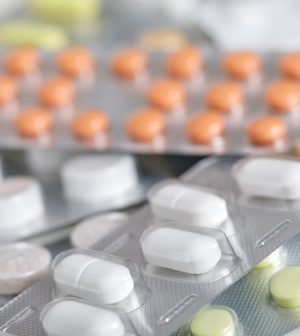- Could Your Grocery Store Meat Be Causing Recurring UTIs?
- Are You Making This Expensive Thermostat Error This Winter?
- Recognizing the Signs of Hypothyroidism
- 10 Strategies to Overcome Insomnia
- Could Artificial Sweeteners Be Aging the Brain Faster?
- Techniques for Soothing Your Nervous System
- Does the Water in Your House Smell Funny? Here’s Why
- Can a Daily Dose of Apple Cider Vinegar Actually Aid Weight Loss?
- 6 Health Beverages That Can Actually Spike Your Blood Sugar
- Treatment Options for Social Anxiety Disorder
Summer’s Heat Can Damage Your Medicines: Keep Them Safe

As scorching temperatures continue to plague the United States this summer, millions of Americans are at risk for dehydration and heat-linked illness.
But what about their medications? Can rising temperatures render those useless and leave patients vulnerable?
Yes they can, so it’s important to understand the effects of heat and humidity on certain drugs, said Dr. Mike Ren, a primary care physician and associate professor in the Department of Family and Community Medicine at Baylor College of Medicine in Houston.
“You don’t want your medications failing on you or for their potency to decrease,” he added in a Baylor news release.
“Aerosolized medications, like inhalers and other medications you breathe in, can be damaged,” Ren explained. “Heat can cause liquid or injectable medications to dry up, making them hard or causing them to evaporate so that they cannot function the way they were intended.”
Even pills such as thyroid medications or birth control pills might look fine after being in the heat, the critical molecules inside can be degraded. Meanwhile, liquid versions of pills can melt in the heat or become gummy.
If you worried that your medication isn’t working after being in the heat, contact your pharmacy or your physician, Ren advised.
What can you do to avoid the problem in the first place?
To safely store medications, Ren suggested:
-
Remove your medications from direct sunlight.
-
Keep your medications at room temperature, in a cupboard, nightstand or in a cool, dry environment.
-
Never leave medications unattended in a vehicle.
More information
The National Weather Service has more on extreme heat and medicines.
SOURCE: Baylor Medicine, news release, July 22, 2024
What This Means for You
When temperatures soar, some medications can become ineffective. Here, an expert offers advice on how to protect the drugs you take for your health.
Source: HealthDay
Copyright © 2026 HealthDay. All rights reserved.










